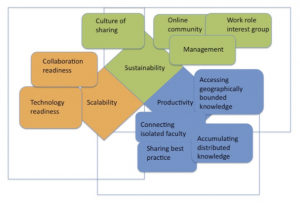
Image courtesy of Airong Luo, Dick Ng'ambi, and Ted Hanss under a Creative Commons license: BY.
Although there are over a quarter of a million open courses published by an increasing number of universities, it remains unclear whether Open Educational Resources (OER) is scalable and productively sustainable. The challenge is compounded when OER is examined in the light of its potential to allow both educators and learners in developing countries to contribute geographically bound learning resources in the context of varied infrastructural, technological and skill constraints. Between October and December 2009, 52 participants involved in various roles related to Health OER from five universities (one in the USA, two in Ghana and two in South Africa) were interviewed. The aim of the study was to investigate sustainability of OER based on possible cross-institutional collaboration as well as social and technical challenges in creating and sharing OER materials. The analytical framework was adopted from prior research in related areas: distributed scientific collaboration; cyber infrastructure; open source development; and Wikipedia. We adopted a qualitative approach for data collection, which included semi structured interviews and document analysis. The findings were analyzed and reported with many direct quotations included. The outcome of the data analysis is a model for productive, scalable, and sustainable OER based on cross-institutional collaboration. The report concludes with practical recommendations on how to the model can be operationalized.
Authors: Airong Luo, Dick Ng'ambi, Ted Hanss
Institutions: University of Michigan, University of Cape Town

Image courtesy of Airong Luo, Dick Ng'ambi, and Ted Hanss under a Creative Commons license: BY.
Jump to:
| Document Title | Creator | Downloads | License |
|---|---|---|---|
|
Fostering Cross-institutional Collaboration for Open Educational Resources Production |
Airong Luo
Dick Ng’ambi
Ted Hanss
|

